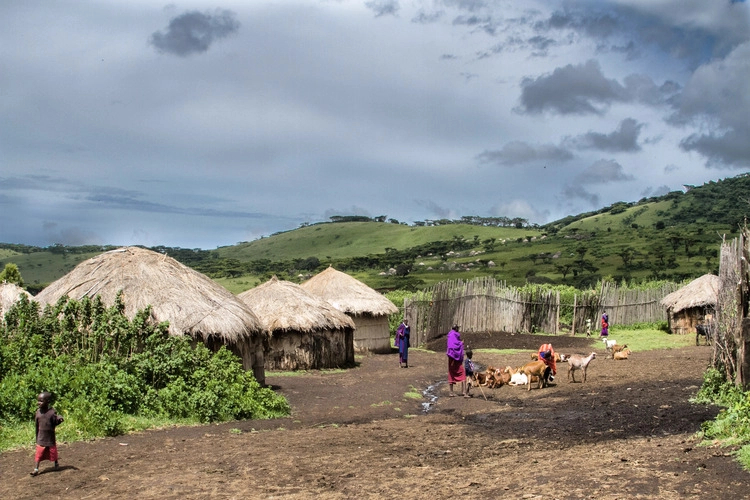
Rural communities face evictions and abuse in the name of conservation, but a local Tanzanian group is helping them to secure their ancestral lands
By
In April this year, the World Bank suspended its funding of a US$150 million project that would expand protected natural areas across southern Tanzania. Testimonies from local communities – collected by the Oakland Institute, a US-based think tank that investigates land grabs in developing countries – had accused wildlife rangers of seizing their livestock, sexual violence and murder. More than 20,000 villagers were facing eviction from their land, which lay within the newly proposed borders of Ruaha National Park.
The lands of Tanzania’s pastoralists and hunter-gatherers are constantly under threat from competing interests, says Paine Makko, the executive director of the Ujamaa Community Resource Team (UCRT), which has won the prestigious 2024 Ashden Award for defending and empowering Indigenous communities.
Makko has spent the past 15 years advocating on behalf of the country’s Indigenous people, and with her team helps communities to secure the rights to their land. It can be a difficult and sometimes lengthy task, one that she has personally experienced from different perspectives. ‘I come from a Maasai community in Loliondo, Ngorongoro District, where UCRT first began its work.’
Sometimes, Makko says, tenure can be secured in as little as a month, but in areas where different parties (the community, government, or local and foreign investors) can’t agree, it can take much, much longer. ‘Unfortunately, UCRT has not succeeded in Loliondo. We’ve tried for 30 years, but it has never happened.’ As a result, in 2022, Loliondo communities lost 1,500 square kilometres of their land after the Tanzanian government ostensibly declared it a protected area. In reality, the land is now leased exclusively to the UAE-based Otterlo Business Corporation, which specialises in luxury safaris and trophy hunting.

The roots of UCRT’s work lie in Tanzania’s colonial history, when British authorities pushed the Maasai out of the Serengeti (a Maasai name that means ‘endless plains’) to create what is now Serengeti National Park. Today, says Makko, people from all over the world can enjoy the beauty and the greatness of the Serengeti and its wild animals. ‘But losing the Serengeti meant a great deal to the Maasai, whose key concern was having access to enough pasture for their livestock,’ she says. ‘That’s not something that threatened the existence of the wildlife.’ There have been many more land losses over the years.
Nonetheless, UCRT has also had many successes. To date, the team has helped communities in northern Tanzania to secure rights to 1.5 million hectares of land (an area three times the size of Grand Canyon National Park, USA). What sets them apart from other organisations doing similar work, says Makko, is their commitment to working closely with communities to build trust and create solutions together. ‘Rather than coming in with external ideas – identifying a specific use for an area without knowing what the community wants – UCRT works to formalise the traditional land plans that communities have been using for a long time.’

Often, it’s the very lifestyles of many traditionally nomadic communities that leave their lands at greater risk of occupation, whether by foreign investors or other businesses, such as large-scale farming. The Hadzabe, one of the world’s last remaining hunter-gatherer people, had lost almost 80 per cent of their land before UCRT intervened. As such, UCRT has pioneered an approach that gives land titles to an entire community, rather than individuals. It’s been essential for the groups the team supports – pastoralists such as the Maasai and the Datoga, and hunter-gatherers such as the Hadzabe and the Akie – who use and manage their ancestral lands communally. Makko hopes to create a learning hub that Indigenous communities beyond Tanzania can use to develop their own approaches to securing land rights.

A map of the districts in which UCRT works shows that each area borders another in northern Tanzania. It reveals another important component of the land titles – they are communal, allowing people and livestock to move around. ‘Mobility is a survival mechanism,’ says Makko. ‘It allows land to regenerate and reduces the rate at which resources are depleted.’ This kind of land management will become increasingly important as communities face the growing challenges of the climate crisis, and UCRT helps pastoralists to develop grazing calendars that will give them access to grass throughout the year while creating healthier ecosystems overall.
‘Local communities are very much in agreement that the environment is most beneficial to them when it is well conserved,’ says Makko. Understandably, however, most consider the Western ideal of conservation – one that separates humans from animals – to be a threat to their traditional ways of life. ‘The way that conservation has historically been carried out has caused them a lot of pain,’ says Makko. When it affects communities that have long coexisted with wildlife, conservation must be done differently.

The Ashden Awards recognise and celebrate innovative and impactful environmental solutions around the world, and are designed to inspire others, raise awareness, and promote scalable solutions to environmental challenges.
The Ashden Award for Natural Climate Solutions (Global South) – defending and empowering Indigenous communities – specifically recognizes the work of Indigenous communities and organizations in protecting and restoring natural ecosystems. These efforts are crucial for mitigating climate change, conserving biodiversity, and ensuring the well-being of Indigenous peoples. The award honours those who are leading the fight to defend their land rights, traditional knowledge, and way of life while also contributing to global climate solutions.




